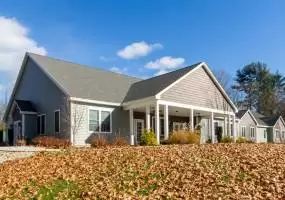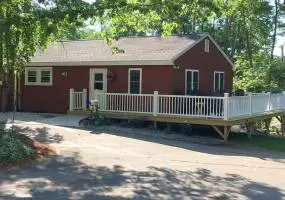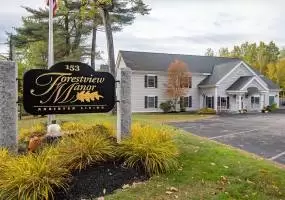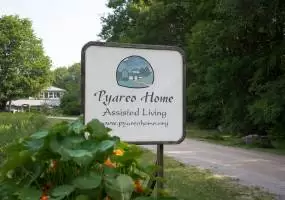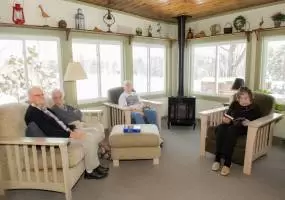![]()
Assisted living in New Hampshire offers seniors a blend of safety, tax advantages, and top-notch medical care.
In New Hampshire, the monthly average cost of assisted living is $6,053, slightly higher than the national average. However, what sets it apart is its lack of a general income tax, with taxes on interest and dividends being phased out by 2027. This tax-friendly environment can make New Hampshire an attractive and budget-friendly option for retirees. Moreover, the state boasts remarkably low crime rates, providing residents with invaluable peace of mind.
In terms of healthcare, seniors have access to a plethora of top-rated options, including renowned hospitals such as Dartmouth-Hitchcock Medical Center, Alice Peck Day Memorial Hospital and Concord Hospital. With almost 19% of its residents aged 65 and above, New Hampshire proudly holds the title of the eighth-largest senior population in the nation.
Our comprehensive guide not only explores the cost of assisted living in New Hampshire but also compares it with neighboring states. We delve into various types of care costs, provide insights into the state’s Medicaid waiver program, and offer free resources beneficial to seniors.
Cost of assisted living
The variables behind the cost of assisted living are tallied into yearly financial figures. Nationally, expect to pay $1,625 to $4,051 a month—based on your needs. Expect a monthly rate of $5,103 if you’re in New Hampshire. Residents gravitate to the costs of assisted living because they’ll bypass the extravagant fees of a fully fledged nursing home.In recent studies, we found the monthly cost of assisted living at $7,513 to $8,517 based on the choice of a private or semiprivate room. New Hampshire residents, however, will pay $9,657 for the same care in a skilled nursing home.
Nursing homes are facilities licensed by the state that provides 24-hour nursing care, room and board, and activities for convalescent residents and those with chronic and/or long-term care illnesses. One step below hospital acute care. Regular medical supervision and rehabilitation therapy are mandated to be available, and nursing homes are eligible to participate in the Medicaid program. May be referred to as Nursing Facility or Convalescent Home.
The Cost of Assisted Living in New Hampshire’s Top Cities
While New Hampshire’s overall average cost of assisted living remains notably higher than the national average, several cities within the state offer more affordable options for care. Notably, cities such as Nashua and nearby Bedford provide assisted living at a monthly rate of $3,683. Similarly, Concord and Keene fall below the state average, with costs totaling $5,295 and $5,758, respectively. On the other hand, Salem exceeds the state average by 3.7%, with costs amounting to $6,446 per month.
Inflation’s Impact on the Cost of Assisted Living in New Hampshire
The relentless march of inflation continues to shape the landscape of assisted living costs in New Hampshire and its surrounding regions. In just one year, from 2022 to 2023, New Hampshire witnessed a substantial surge in average assisted living expenses, soaring from $5,191 to $6,217—an impressive 19.7%
Exploring Senior Living Costs
Senior living costs in New Hampshire span a wide spectrum depending on the level of care and additional services required. Independent living typically averages around $3,874, offering a more autonomous lifestyle for seniors. On the other end of the spectrum, intensive memory care programs demand significantly more resources, with costs reaching nearly double at $7,169.
Assisted living, with an average cost of $6,217, falls closer to the range of memory care in New Hampshire. However, it’s important to note that various factors such as medication management, specialized therapy, and other auxiliary services can impact the total expenses associated with assisted living.
For seniors and their families navigating the complexities of senior living costs and determining the most suitable option, it’s essential to explore the array of services and levels of care available. Discover more about independent living, memory care, and assisted living options tailored to the unique needs of seniors in New Hampshire.
Medicaid Coverage for Assisted Living in New Hampshire
Wondering if Medicaid covers assisted living in New Hampshire? The answer lies in the state’s Choices for Independence Program,, formerly known as the Home and Community-Based Care Program for the Elderly and Chronically Ill.
What Assisted Living Services Are Covered by Medicaid in New Hampshire?
New Hampshire Medicaid extends its coverage to supportive services for seniors who qualify for nursing home placement but prefer to receive care within their community or at home. This coverage encompasses various settings, including assisted living and residential treatment facilities. Services under this program typically include:
- Assistance with activities of daily living
- Health support and medication assistance
- Participant-directed managed care options
- Assisted Living Waiver Programs in New Hampshire
One of the prominent programs in this realm is the Choices for Independence (CFI) program, overseen by the Bureau of Elderly and Adult Services. CFI caters to the cost of services rendered at approved assisted living facilities, ensuring they do not exceed a specified percentage of what recipients would pay for equivalent care in a nursing facility.
CFI empowers seniors by enabling them to select their preferred case manager and service providers.
Covered services include:
- Adult day medical care
- Case management
- Community transition assistance
- Environmental accessibility services
- Financial management
- Personal emergency response systems
- Physical, occupational, and speech therapy
- Specialized medical equipment
- Eligibility for CFI requires applicants to be at least 65 years old and fulfill specific financial and medical criteria.
Enrolling in CFI involves a streamlined three-step process.
For more information on Medicaid coverage and assisted living services tailored to seniors in New Hampshire, delve into our comprehensive resources and guidance.
Determining Medicaid Eligibility in New Hampshire
Curious about your eligibility for Medicaid in New Hampshire? Eligibility assessments are conducted by the Bureau of Family Assistance and the Bureau of Elderly and Adult Services under the Department of Health and Human Services (DHHS). To qualify for Medicaid in the state, applicants must meet the following criteria:
- Age: Be 65 years or older.
- Residency: Currently reside in New Hampshire.
- Citizenship: Be a U.S. citizen or eligible qualified alien.
- Income: Meet specific income requirements. As of 2023, single applicants can have an income of up to $32,904 annually (equivalent to $2,742 per month).
- Assets: Have assets valued at no more than $2,500.
Navigating the complexities of Medicaid eligibility can be daunting, but understanding these criteria is the first step in accessing essential healthcare services. Explore our resources to learn more about the application process and available support for seniors in New Hampshire.
Assisted Living Regulations and Compliance in New Hampshire
In New Hampshire, the oversight of assisted living facilities falls under the purview of the Health Facilities Administration, a division of the Department of Health and Human Services. These facilities are subject to stringent regulations aimed at ensuring the highest standards of care, safety, and well-being for residents.
Licensing and Oversight
Assisted living facilities in New Hampshire must obtain proper licensing from the Health Facilities Administration to operate legally. This licensing process involves thorough inspections and assessments to ensure compliance with state regulations.
Quality of Resident Care
Ensuring the quality of resident care is paramount in New Hampshire assisted living facilities. These facilities must adhere to guidelines that govern the provision of personal care services, assistance with activities of daily living (ADLs), and medical support tailored to individual needs.
Staffing Requirements
Staffing plays a crucial role in delivering quality care within assisted living communities. Regulations in New Hampshire mandate appropriate staffing levels to ensure residents receive adequate attention and support. This includes requirements for trained personnel to assist with medical needs, personal care, and emergency response.
Safety Measures
Safety is a top priority in New Hampshire assisted living facilities. Regulations cover various aspects, including building safety standards, emergency preparedness, and protocols for preventing accidents and injuries among residents.
Medication Management
Proper medication management is essential to residents’ health and well-being. Assisted living facilities in New Hampshire must adhere to strict guidelines regarding the storage, administration, and documentation of medications to ensure residents receive their prescribed treatments safely and accurately.
Reporting Abuse
Reporting any form of abuse or neglect is mandatory for staff in New Hampshire assisted living facilities. These facilities are required to have procedures in place for reporting and investigating incidents of abuse, ensuring swift action to protect residents and address any concerns.
By adhering to these comprehensive regulations and standards, assisted living facilities in New Hampshire strive to provide a supportive and secure environment where residents can thrive with dignity and peace of mind. For more information on assisted living laws and regulations in New Hampshire, explore our resources tailored to your needs.
NH Assisted Living By Region
- Bedford NH Assisted Living
- Manchester NH Assisted Living
- Portsmouth NH Assisted Living
- NH Seacoast Assisted Living
- Lakes Region Assisted Care NH
- Sunapee NH Assisted Living
- White Mountains
- Monadnock
- Great North
- What’s the difference between assisted living and nursing care?
- Community spotlight: active adult living
- Your Type – Active Adult Living

2 Evaluating NH Assisted Living Communities
Costs at NH Assisted Living Communities
The 1.71% to 3.64% yearly increase in the cost of facility care is a phenomenon across the United States. Training employees, meeting health regulations and ensuring the highest medical standards have become more costly for care facilities to achieve. Knowing the trends behind your cost can help you to strategize when choosing the right facility. You must first determine the quality of life you need.
In New Hampshire, the average cost of assisted living is around $6,000 per month, but this can range anywhere from $4,000 to $8,000 depending on the facility. It’s important to keep in mind that costs may increase as a resident’s care needs change over time. Many assisted living communities offer different levels of care packages to accommodate individual needs, and these packages can come with additional costs. Some communities may also charge one-time move-in fees or require deposits.
- Assisted Living Research Checklist
- Assisted Living Tour Checklist
- Assisted Living Follow-Up Checklist
The following are factors that dictate your cost and retirement options:
Where to retire in New Hampshire
Yes, New Hampshire care facilities cost more than other states, but where within the White Mountain State you look also plays a role. Start with the following details that raise or lower your financial responsibilities overall:
- Private Rooms
The median cost for private rooms reached $102,200 yearly in 2019. Being in a shared space costs less, but you must take into account your quality of life and the medical conditions you have. - Overall Community
Care facilities for seniors are found in cities and suburbs. Facilities that are built by a lake, however, are likely to cost more than those in metropolitan regions. - Counties and States
In a statewide comparison, the city of Manchester presents the highest cost for senior care in New Hampshire.
Where in New Hampshire?
Deciding on where in a facility and where in the state must be followed by a decision based on what you will receive from your facility of choice. The following points express the details of costs as related to the senior services you need:
- Full vs. Assisted
2019 ended with an average yearly cost of $48,612 for assisted living. Full service, which exists in nursing homes, requires more services and cost more. “Assisted living,” which only assists residents, requires less services but may not give you the quality of life you need. - Partial vs. Full Dependence
In some cases within assisted living, residents are allowed to leave and socialize in a leisurely way. Other conditions call for a trained specialist to constantly monitor a resident and their daily health.
Why Assisted Living?
The elderly prefer assisted living when they feel functional enough to live their own lives but see the benefit of having medical aides around them. Whether you or a loved one wants more freedom or aren’t entirely ill, then this type of living can be an ideal choice. No one can foresee the medical, social or personal needs they’ll have when aging. Assisted living lets you live in a manner you please while always having professionals around if needed. The National Center for Assisted Living states “Assisted living communities serve individuals who typically need help with every day activities and some health care services but do not require 24-hour skilled nursing care.”
|
Activity of Daily Living
|
% of Residents Needing Help
|
|
Medication Management
|
81% |
|
Meal Preparation
|
87% |
|
Bathing
|
72% |
|
Dressing
|
52% |
|
Toileting
|
36% |
|
Transferring
|
25% |
|
Eating
|
22% |
Cost is another determining factor. Assisted living protects your quality of life as you age but with a lower overhead for medical care given on a personal level. Some geriatrics see their possessions and other financial responsibilities as easier to get rid of by entering a facility that aids them in the latter phases of life. Having assistance 24/7 could be your best plan in the case of an emergency.
What Makes an NH Assisted Living Community Worth Your Time
The price you pay for assisted living is only justified when you get the exact care your medical conditions require. Find out what you have in common with residents and staff members you meet. Facilities that truly value their residents’ lives are personal and open minded. Prior to registering, you have ample opportunity to speak with the staff, ask questions and share your concerns. Here are three-key points to go over:
The Services at NH Assisted Living Communities
-
- 24/7 Support
Will the staff be available around the clock, and will they be able to answer to your needs promptly? Ask about what 24/7 surveillance includes. - Transportation
Does the facility offer shuttles along with wheelchairs when you need them? Look for routine schedules that determine when and how you can leisurely exit a facility. - Food Preparations
Are meals provided three times a day or only when you request them? Consider your freedom to prepare your own meals and dine out. - Facility Maintenance
Who cleans the facility, and how much attention will they give to your quarters? Try to find out how much daily responsibilities you have. - Scheduled Activities
Are there scheduled trips or activities? If so, how often?
- 24/7 Support
Are there scheduled trips or activities? If so, how often?
The Values
“Custom care” should be the ideology of every retirement facility. Each facility has national protocols to follow, but the details of each resident require unique approaches. A staff that looks at your case as special is a team that can cater to the specific needs you have. Whether it’s dealing with Alzheimer’s or stroke patients, the service of any facility that offers assisted residences needs a flexible approach for the dynamic group of residents they have.
The Medical Support at NH Assisted Living Communities
Trained professionals:
Are there qualified people to give medical care and aid within the care facility?
For example, do you need hospice professionals, those who deal with patients who are living with incurable diseases?
Do you need nurses who have the education to administer advanced life support (ALS) to intervene in emergencies?
Will physicians be available on a 24-hour basis? Look for doctors who are competent and show a passion for the well-being of others. Be sure to ask such questions that pertain to the medical aid you’ll receive.
Daily Logs and Reporting—Does the facility track patient progress and medical incidents? Every facility has two to four shifts. These consist of people who might not be aware of the medical event you had prior to their shift. Ensure that your facility uses documentation to provide accurate treatment in all conditions.
Physical Training — Will rehabilitation sessions be available? Your potential of recovering from mild injuries is based on the help you have from on-site aides. Look for exercise rooms and personal trainers who can improve your overall health in New Hamphire.




